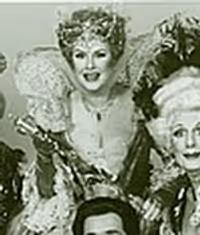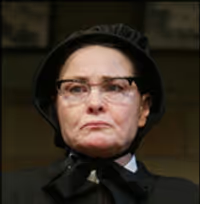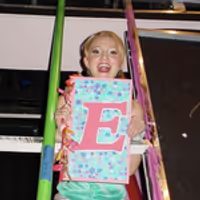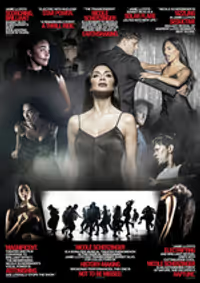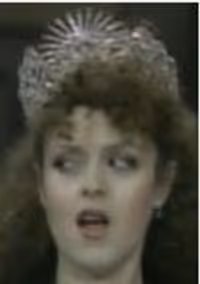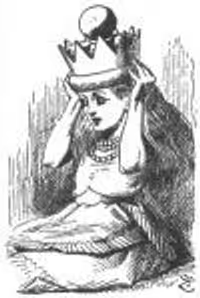Light In The Piazza
#50Light In The Piazza
Posted: 5/27/25 at 10:46am
kdogg36 said: "Well, this is the very crux of the show's conflict, for Margaret and, I suppose, for audiences. Is Clara an overgrown child who needs to be forever protected and never allowed to make decisions for herself? Or is she a capable free agent who can choose the life she wants to lead?
Throughout the first act, Margaret believes the former proposition, but the happenings in the second act convince her that Clara deserves to choose her own path. The title song does a lot of work in convincing Margaret to change her mind about this; she goes from a mother reluctantly indulging what she hopes is a passing infatuation to a mother willing to stand up for her daughter's right to marry the love of her life.
I've always taken it for granted that Clara is a fully competent adult, despite her limitations and eccentricities, and that Margaret's concerns are misplaced and shaped by her poor relationship with her own husband. So the possibility of "pedophilia," or, more precisely,lack of consent in her relations with Fabrizio, never really entered my mind."
I really like this interpretation. I think you are right. This is how I will view the musical now. I know the composer said he liked the project because he liked the ambiguous ending, it is not clear if it will be all happy since Clara is disabled, but she may indeed be a fully competent adult.
#51Light In The Piazza
Posted: 6/10/25 at 6:01pm
I wish I could get back up to Boston to see this again. It was definitely a highlight of my Spring.
Updated On: 6/10/25 at 06:01 PM
#52Light In The Piazza
Posted: 6/10/25 at 6:12pm
QueenAlice said: "Some of you have never spent time around horses."
Camp.
#53Light In The Piazza
Posted: 6/10/25 at 10:40pm
MagicalMusical said: "I know the composer said he liked the project because he liked the ambiguous ending, it is not clear if it will be all happy since Clara is disabled, but she may indeed be a fully competent adult."
I love the ambiguous ending too. I think "Fable" is all about Margaret acknowledging, from her own lived experience, that true happy endings are unlikely under the best of circumstances, but that there's a lot to be valued in the pursuit of the happy ending, and that Clara deserves the chance to pursue it. "Love, if you can, oh my Clara. Love, if you can, and be loved." Margaret has loved, and been loved, and lost, and she finally acknowledges that she's done Clara a disservice by trying to protect her from that same pleasure/ordeal.
#54Light In The Piazza
Posted: 6/10/25 at 10:59pm
kdogg36 said: "MagicalMusical said: "I know the composer said he liked the project because he liked the ambiguous ending, it is not clear if it will be all happy since Clara is disabled, but she may indeed be a fully competent adult."
I love the ambiguous ending too. I think "Fable" is all about Margaret acknowledging, from her own lived experience, that true happy endings are unlikely under the best of circumstances, but that there's a lot to be valued in the pursuit of the happy ending, and that Clara deserves the chance to pursue it. "Love, if you can, oh my Clara. Love, if you can, and be loved." Margaret has loved, and been loved, and lost, and she finally acknowledges that she's done Clara a disservice by trying to protect her from that same pleasure/ordeal."
That is so beautifully described Kdogg... I'm embarrassed that I hadn't thought that deeply into it, but doubt I will listen to the score the same way.
#55Light In The Piazza
Posted: 6/10/25 at 11:02pm
chernjam said: "That is so beautifully described Kdogg... I'm embarrassed that I hadn't thought that deeply into it, but doubt I will listen to the score the same way."
Thanks! Good to see you around the boards, as always!
#56Light In The Piazza
Posted: 6/11/25 at 3:42am
chernjam said: "kdogg36 said:I love the ambiguous ending too. I think "Fable" is all about Margaret acknowledging, from her own lived experience, that true happy endings are unlikely under the best of circumstances, but that there's a lot to be valued in the pursuit of the happy ending, and that Clara deserves the chance to pursue it. "Love, if you can, oh my Clara. Love, if you can, and be loved." Margaret has loved, and been loved, and lost, and she finally acknowledges that she's done Clara a disservice by trying to protect her from that same pleasure/ordeal."
That is so beautifully described Kdogg... I'm embarrassed that I hadn't thought that deeply into it, but doubt I will listen to the score the same way."
Yes, kdogg36, beautiful and brilliant insight into the story.
#57Light In The Piazza
Posted: 6/11/25 at 4:29am
QueenAlice said: "Some of you have never spent time around horses. Injuries related to being kicked by a horse can absolutely result in major brain injuries. I think what some of you are interpreting as camp is an eggageration of Clara's "sweet, childlike docility" in the story as a result of the accident. But as someone who grew up around horses, the injuries a horse can cause are pretty far from camp."
I think you’re right it’s just that there is something tonally that feels a little I don’t know, fluffy combined with privilege to describe a ‘pony accident’ so sincerely and seriously. You’re right I’m sure it’s real there is just something that doesn’t translate when it’s put on stage. I think the story would feel heavier if it was anything but this - a vehicle accident, a medical condition, an attack, I don’t know. Even just being born this way.
Especially jarring next to parts of the material that I think work so brilliantly, such as how kdogg describes ‘Fable’. Anyway, it is only a small part so it doesn’t really matter but it’s the kind of thing forbidden Broadway could write a whole song about (if they haven’t already).
#58Light In The Piazza
Posted: 6/11/25 at 8:22am
binau said: "QueenAlice said: "Some of you have never spent time around horses. Injuries related to being kicked by a horse can absolutely result in major brain injuries. I think what some of you are interpreting as camp is an eggageration of Clara's "sweet, childlike docility" in the story as a result of the accident. But as someone who grew up around horses, the injuries a horse can cause are pretty far from camp."
I think you’re right it’s just that there is something tonally that feels a little I don’t know, fluffy combined with privilege to describe a ‘pony accident’ so sincerely and seriously. You’re right I’m sure it’s real there is just something that doesn’t translate when it’s put on stage. I think the story would feel heavier if it was anything but this - a vehicle accident, a medical condition, an attack, I don’t know. Even just being born this way.
Especially jarring next to parts of the material that I think work so brilliantly, such as how kdogg describes ‘Fable’. Anyway, it is only a small part so it doesn’t really matter but it’s the kind of thing forbidden Broadway could write a whole song about (if they haven’t already).
"
The specificity of the accident gives the characters, themselves, specificity. Piazza is the story of a wealthy woman and her daughter from Winston Salem, NC, an area specifically known as “horse country.”
Videos


